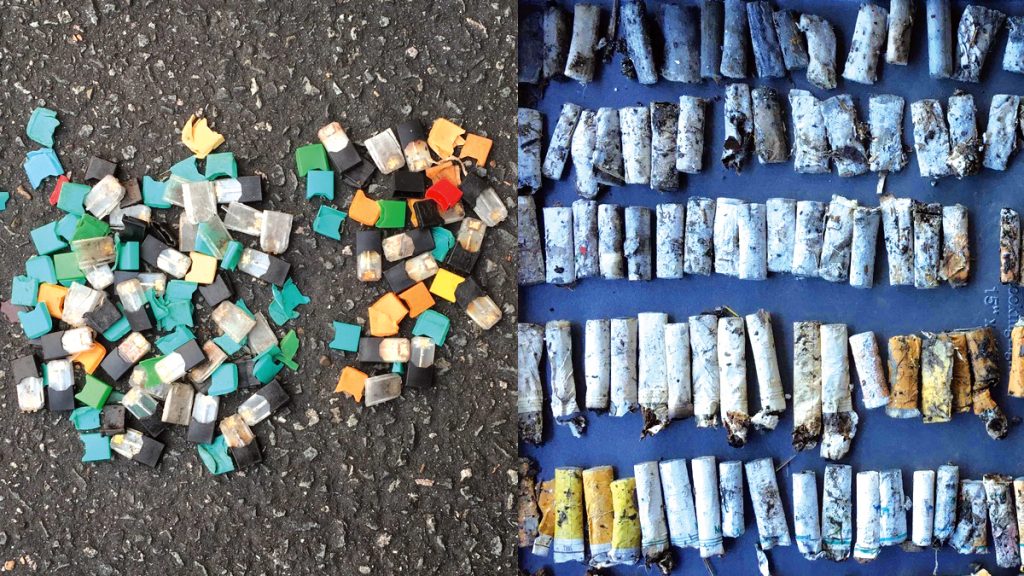
News from the Noteworthy from Tobacco-Free Communities: Delaware, Otsego & Schoharie
Tobacco Waste Harmful to Environment
Earth Day offers the chance to raise awareness of behavior and practices that harm the environment but were not realized previously. Most people know tobacco use is bad for your health, but not as many know that tobacco waste is terrible for the environment. Cigarette butts, the most littered items in the world, and e-cigarette waste are not biodegradable and contaminate our waterways, soil, and wildlife with toxic chemicals and plastics. Worse, almost no tobacco waste can be recycled and disposing of it further harms the environment.
Every year, 4.5 trillion cigarette butts are littered worldwide, 65 percent of them deliberately. According to the Public Health Law Center, that weighs 850,000 tons or about 30 times the weight of the Statue of Liberty. PHLC also reports that “in just western New York, approximately 1 billion cigarettes are smoked annually. In 2019, 339,716 cigarette butts, 44,822 cigar tips, and 1,868 other tobacco product waste items were collected from the Great Lakes Basin, including Lake Erie. Cigarette butts are among the most commonly found objects in sewer overflows that feed into the Hudson River.”
Cigarette butts do not biodegrade because they contain cellulose acetate, a type of plastic. The PHLC reports, “Over time, cellulose acetate breaks down physically into thousands of microplastic fibers, which are ubiquitous and have been found in the stomachs of birds and fish and even deep in the ocean.” In November 2022, the United Nations Environment Programme designated cigarette filters as a form of single-use plastic and held negotiating sessions to ban or strictly regulate all single-use plastics so as to reduce pollution and save the ocean. New York State proposed similar legislation, the Tobacco Product Waste Reduction Act, which “would prohibit the sale of cigarettes using single-use filters (cigarette butts) and ban the sale of single-use electronic cigarettes” in the state. It has failed to advance in the past and was reintroduced for the 2023-2024 legislative session.
E-cigarette waste is not as widespread as cigarette butts, but is even more harmful for the environment. E-cigarettes, or vapes, have three main components—lithium battery, heating part, and cartridge—none of which is biodegradable. Worse, lithium batteries are prone to explosions and fires and the concentrated nicotine liquid in cartridges can be very harmful to human skin and, if ingested, even fatal to small children and wildlife. The Environmental Protection Agency categorizes nicotine as hazardous waste because it can be fatal to humans; the EPA and other federal agencies have restrictions on disposing of it safely. However, few methods for disposing of e-cigarettes according to federal safety regulations exist nationwide. With no safe or accessible ways to dispose of their vapes, or even awareness they need to do so, vapers often throw them in the trash or on the ground.
This problem is exacerbated by the tobacco industry, which began selling disposable flavored vapes to get around the 2019 federal ban on flavored vape sales. The PHLC reports that “about 53 percent of e-cigarettes sold today are disposable, meaning they cannot be refilled and reused after the initial cartridge runs out.” Users then throw them in the trash like other disposable products. Currently, waste management companies eliminate littered disposable vapes by incinerating them, which is dangerous and releases pollutants and high amounts of carbon into the air.
The tobacco industry currently does not pay for the high financial or environmental costs of disposing of its products, leaving the rest of us to manage them. Schools nationwide have been especially burdened by this. Young people try to secretly dispose of vape devices by flushing them down toilets or stuffing them into pipes, which ruins the plumbing. When schools confiscate e-cigarettes from students, they then have to manage the large amounts of hazardous waste and pay for their safe disposal. The PHLC reported that in New York State, “Monroe County school officials confiscated and collected over 226 pounds of e-cigarettes in 2022,” and rural Putnam County schools, “approximately 90 pounds of vape devices each year.”
The state has also been trying to manage the large amount of e-cigarette waste since it banned flavored nicotine e-cigarette products in 2020 to address the vaping epidemic, including retail stock that can no longer be legally sold. At the same time, the 2020 laws’ loopholes and limitations in enforcing them have meant distributors continue to ship flavored vapes to retailers, who can then evade enforcement and continue selling them illegally, leading to more e-cigarette waste. Currently, the state Senate and Assembly have proposed legislation to address the loopholes this year.
Preventing, managing and ultimately eliminating tobacco waste is complex, with no easy solutions. Earth Day can be used to make everyone aware of the severe impact tobacco waste has on the environment. Schools, local governments, and organizations can work together to create and implement solutions that curb and reduce the supply of tobacco products, and therefore, tobacco waste. To get involved, contact TFC-DOS Youth Engagement Coordinator Nicole Schuck at Nicole.Schuck@sphp.com and Community Engagement Coordinator Jennifer Hill at Jennifer.Hill003@sphp.com.
Jennifer Hill is community engagement coordinator for Tobacco-Free Communities: Delaware, Otsego & Schoharie.

